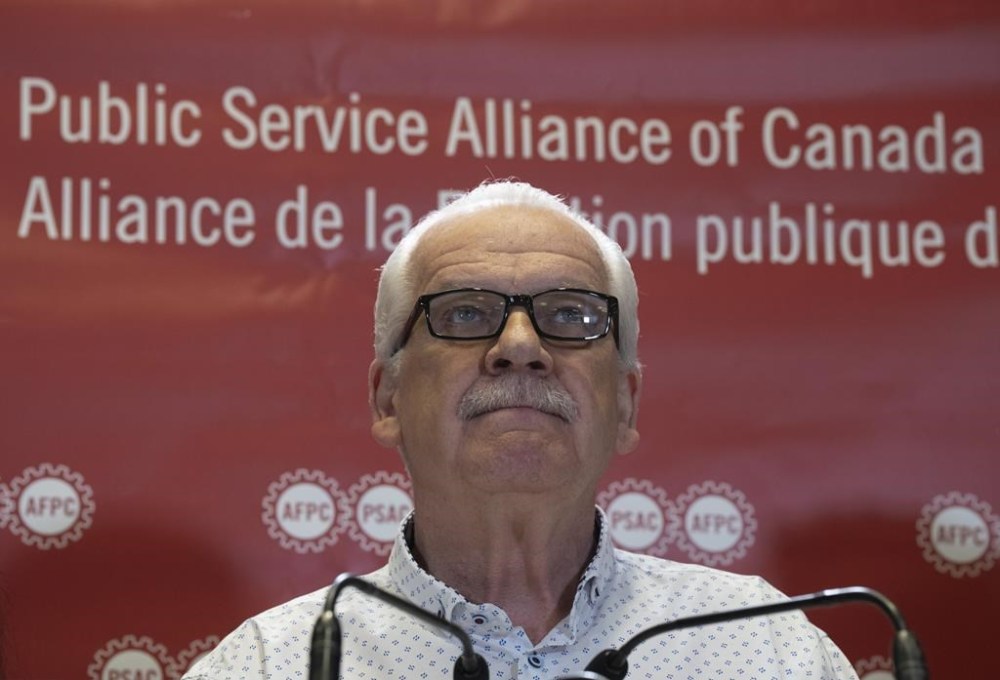Here’s what the looming public-service strike would look like for hybrid workers
Advertisement
Read this article for free:
or
Already have an account? Log in here »
To continue reading, please subscribe:
Monthly Digital Subscription
$1 per week for 24 weeks*
- Enjoy unlimited reading on winnipegfreepress.com
- Read the E-Edition, our digital replica newspaper
- Access News Break, our award-winning app
- Play interactive puzzles
*Billed as $4.00 plus GST every four weeks. After 24 weeks, price increases to the regular rate of $19.00 plus GST every four weeks. Offer available to new and qualified returning subscribers only. Cancel any time.
Monthly Digital Subscription
$4.75/week*
- Enjoy unlimited reading on winnipegfreepress.com
- Read the E-Edition, our digital replica newspaper
- Access News Break, our award-winning app
- Play interactive puzzles
*Billed as $19 plus GST every four weeks. Cancel any time.
To continue reading, please subscribe:
Add Free Press access to your Brandon Sun subscription for only an additional
$1 for the first 4 weeks*
*Your next subscription payment will increase by $1.00 and you will be charged $16.99 plus GST for four weeks. After four weeks, your payment will increase to $23.99 plus GST every four weeks.
Read unlimited articles for free today:
or
Already have an account? Log in here »
Hey there, time traveller!
This article was published 18/04/2023 (921 days ago), so information in it may no longer be current.
OTTAWA – Canada’s federal public servants will need to show up at the picket line for four hours each day — even if their union has been trying to negotiate permanent work-from-home arrangements with the government.
The Public Service Alliance of Canada announced that some 155,000 workers will go on strike after talks with the government failed to produce an agreement before its Tuesday night deadline.
The union said strike action would begin Wednesday at 12:01 a.m. EDT.

Chris Aylward, the union’s national president, said the bargaining teams would remain at the table throughout the strike.
Many of those employees work in an office only two or three days a week, but the union’s president, Chris Aylward, says they will have to scan a barcode at a picketing location every day in order to receive strike pay.
For members who choose not to show up, there will be consequences, he said in an interview.
“If you do not participate in a picket line, then you are not participating in a strike, and there are provisions in the constitution for discipline and members can have their membership suspended,” Aylward said.
He said that there will be exceptions to the rules for those who have mobility issues, disabilities or have discussed their circumstances with the union.
They will be given other administrative duties to complete in lieu of picketing.
The president of the Ontario Federation of Labour says there are many ways that workers can contribute to their colleagues’ efforts from their living rooms, such as by joining labour committees and raising awareness on social media.
“There could be a team of people that are communicating with the members via newsletters or text messages or calls,” said Patty Coates.
“There are lots of different things that can happen behind the scenes. It’s not just the workers that are walking the picket line.”
Coates, who said she has organized several strikes, said the labour federation supports the potential job action and noted the cost of living continues to rise.
Wages have been at the forefront of the union’s negotiations with government, though other issues, such as more anti-racism training for government and an entrenching of the hybrid workplace, have also been on the table.
“If you do not participate in a picket line, then you are not participating in a strike, and there are provisions in the constitution for discipline and members can have their membership suspended.”–Chris Aylward
Jennifer Carr, the president of the Professional Institute of the Public Service of Canada, said that although her union has chosen the arbitration route, it has hosted webinars to inform its members about how they can support the potential strikers.
“We are showing that solidarity by those actions,” she said.
While workers are at home, unions cannot monitor everything members are doing — such as checking work-related emails or calls.
Carr acknowledged that each union takes its own approach, but she said that if members of her union were striking, she would ask them to comply with the collective agreement rules around striking and not to check any work-related channels.
This report by The Canadian Press was first published April 18, 2023.
———
This story was produced with the financial assistance of the Meta and Canadian Press News Fellowship.




